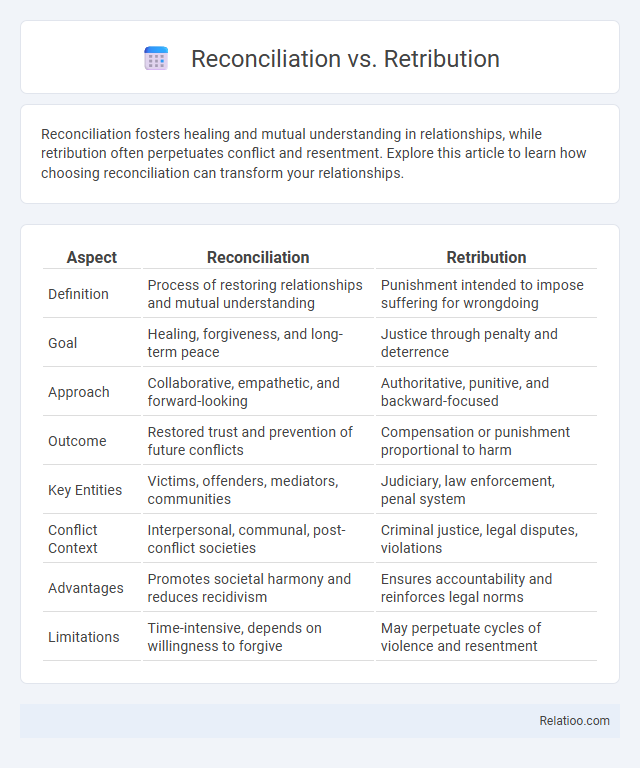Reconciliation fosters healing and mutual understanding in relationships, while retribution often perpetuates conflict and resentment. Explore this article to learn how choosing reconciliation can transform your relationships.
Table of Comparison
| Aspect | Reconciliation | Retribution |
|---|---|---|
| Definition | Process of restoring relationships and mutual understanding | Punishment intended to impose suffering for wrongdoing |
| Goal | Healing, forgiveness, and long-term peace | Justice through penalty and deterrence |
| Approach | Collaborative, empathetic, and forward-looking | Authoritative, punitive, and backward-focused |
| Outcome | Restored trust and prevention of future conflicts | Compensation or punishment proportional to harm |
| Key Entities | Victims, offenders, mediators, communities | Judiciary, law enforcement, penal system |
| Conflict Context | Interpersonal, communal, post-conflict societies | Criminal justice, legal disputes, violations |
| Advantages | Promotes societal harmony and reduces recidivism | Ensures accountability and reinforces legal norms |
| Limitations | Time-intensive, depends on willingness to forgive | May perpetuate cycles of violence and resentment |
Understanding Reconciliation and Retribution
Reconciliation involves restoring relationships through forgiveness, dialogue, and mutual understanding, aiming to heal divisions after conflict. Retribution focuses on punishment and accountability, holding perpetrators responsible for their actions to ensure justice. Both approaches address conflict aftermath but differ fundamentally in their goals: reconciliation seeks peace and unity, while retribution emphasizes justice and deterrence.
Historical Contexts of Justice Approaches
Historical contexts of justice reveal that reconciliation emphasizes restoring relationships and social harmony after conflicts, often seen in post-apartheid South Africa. Retribution focuses on punishment for wrongdoing, exemplified by the Nuremberg Trials following World War II. Reconstruction aims to rebuild societies and institutions damaged by conflict, as demonstrated in post-Civil War United States, highlighting different approaches to how your pursuit of justice can be framed.
Core Principles of Reconciliation
Reconciliation centers on restoring relationships through mutual understanding, forgiveness, and truth-telling to heal communities affected by conflict or injustice. It emphasizes dialogue, acknowledgment of past harms, and building trust to foster social cohesion and long-term peace. Unlike retribution's focus on punishment or reconstruction's physical and institutional rebuilding, reconciliation prioritizes emotional and moral repair as the foundation for sustainable recovery.
Fundamental Tenets of Retribution
Retribution centers on the principle of justice through proportional punishment, emphasizing accountability by ensuring offenders receive penalties commensurate with their crimes. This fundamental tenet upholds the idea that punishment serves as a moral response to wrongdoing, reaffirming societal norms and deterring future offenses. Your understanding of retributive justice highlights its focus on balanced consequences rather than restoration or healing processes found in reconciliation or reconstruction.
Key Differences Between Reconciliation and Retribution
Reconciliation involves restoring relationships and fostering mutual understanding after conflict, emphasizing forgiveness and healing, while retribution centers on punishment as a response to wrongdoing, aiming to uphold justice and deter future offenses. Reconciliation seeks to repair social cohesion by addressing root causes and promoting dialogue, whereas retribution prioritizes accountability through legal or moral penalties. The fundamental difference lies in reconciliation's forward-looking approach to peacebuilding versus retribution's backward-looking focus on penalizing past actions.
Impacts on Victims and Communities
Reconciliation fosters healing by promoting forgiveness and restoring relationships, which can help victims regain a sense of dignity and community trust. Retribution emphasizes justice through punishment, often providing victims with a sense of closure but risking ongoing cycles of resentment or trauma within communities. Reconstruction focuses on rebuilding social structures and addressing systemic harm, enabling Your community to recover and thrive through inclusive development and long-term peace.
Role in Conflict Resolution and Peacebuilding
Reconciliation promotes healing and trust-building by addressing grievances and fostering mutual understanding among conflicting parties, essential for sustainable peace. Retribution focuses on justice through accountability and punishment, aiming to deter future violations but may risk perpetuating resentment if unbalanced. Reconstruction emphasizes rebuilding physical infrastructure and social institutions, creating a stable environment that supports long-term recovery and peace consolidation after conflict.
Global Case Studies: Successes and Failures
Global case studies on reconciliation, retribution, and reconstruction reveal varied outcomes in post-conflict societies. South Africa's Truth and Reconciliation Commission successfully promoted national healing without extensive retribution, whereas Rwanda's Gacaca courts emphasized community-based retribution but struggled with fairness and long-term reconciliation. In contrast, post-war Bosnia faced challenges in reconstruction efforts due to lingering ethnic tensions and incomplete justice mechanisms, underscoring the complex balance needed between these approaches for sustainable peace.
Modern Challenges and Criticisms
Reconciliation efforts often face modern challenges such as political polarization and deep-rooted social inequalities that hinder genuine dialogue and trust-building between conflicting parties. Retribution, while intended to deliver justice, is frequently criticized for perpetuating cycles of violence and failing to address systemic issues underlying conflicts. Reconstruction initiatives aim to rebuild societies, but Your success depends on inclusive governance and sustainable economic development, which are often obstructed by corruption and limited resources.
Choosing the Right Path: Toward a Balanced Justice System
Choosing the right path between reconciliation, retribution, and reconstruction requires balancing accountability with healing to achieve a just society. Reconciliation emphasizes restoring relationships and addressing harm through dialogue and forgiveness, while retribution focuses on punishment proportional to offenses to deter future crimes. Reconstruction aims to rebuild social and institutional frameworks disrupted by conflict or injustice, creating a foundation for long-term peace and equity.

Infographic: Reconciliation vs Retribution
 relatioo.com
relatioo.com